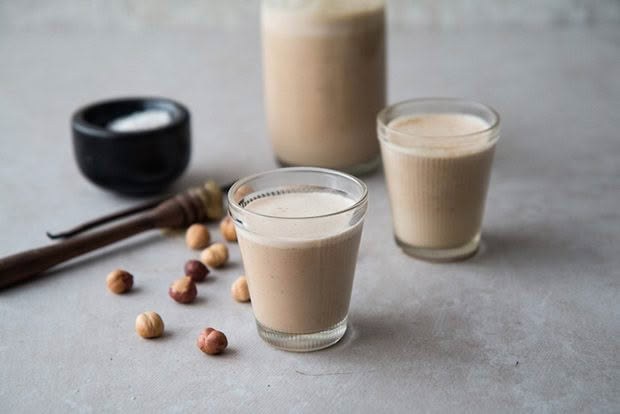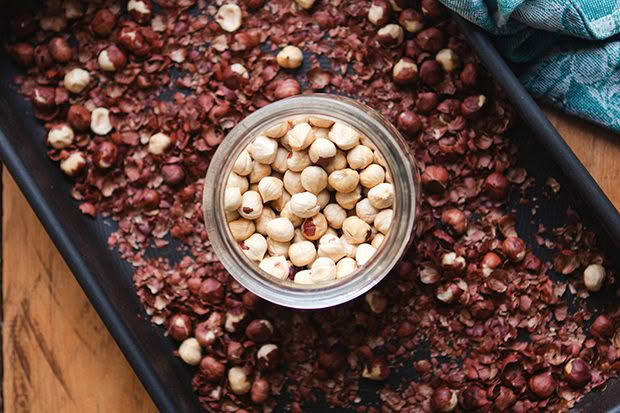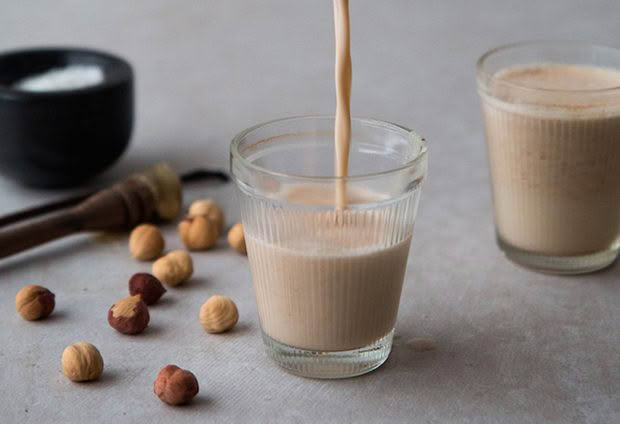Nicola Galloway: Slow-Roasted Hazelnut Milk

Nicola talks about the importance of shopping locally – and the deliciousness that comes with it.
The food we choose to cook and eat can be influenced by many factors. This will be quite individual for each one of us depending on our beliefs, upbringing, location, what we can afford, etc. Even though I don’t like to put a label on the way I choose to eat, if I had to name one that resonates most it would be locavore.
Locavore: ‘a person whose diet consists only or principally of locally grown or produced food.’
*definition according to the Oxford Dictionary.
Even within this definition there is a rigidity, while in this global world we have access to a wide variety of foods that can bring a lot of joy to our cooking and consequential eating. In particular, foods that don’t grow so easily in our climate such as some spices, chocolate, tea and coffee to name a few. So there has to be some leeway within the parameters of any choice we make.
My focus, when possible, is to source as much of our food locally and grow what I can. It can take some research to find local growers and producers, but with it comes an added sense of community and belonging. Something that can be lacking when we shop solely at supermarkets surrounded by packaged food. Don’t get me wrong, I also shop at our local supermarket but ideally, this isn’t my first port of call.

Nuts are one of my favourite foods to source locally. These can come from a local grower, a friend’s backyard or even foraged from public land (in Nelson I use the Nelson Marlborough Food Map to find edibles). Gathering any food yourself is very rewarding (and free) and I have a few favourite spots that I visit each autumn. The nuts are then left to dry in a sunny spot before we begin cracking.
We have also planted a row of nut trees on the boundary of our property (I have written about this here before). On an 800m2 suburban property this is quite ambitious, but we are now getting a decent harvest each season. The trick is to beat the rodents to them as the nuts fall from the tree. In autumn, just like us, they are busy storing food for winter.
Hazelnuts are my favourite nut for their wonderful flavour. My chosen preparation is to slow-roast them before use. This boosts the flavour and softens the nut flesh, versus, roasting at a higher heat which hardens the nut. In the recipe that follows I share one of my favourite ways to use roasted hazelnuts in a simple nut milk that can be used as a dairy milk alternative.
Slow-Roasted Hazelnut Milk

This nut milk recipe requires no pre-soaking, the slow-roasting of the hazelnuts softens the nut flesh so it blends easily. As explained in the recipe, straining is optional, in fact, un-strained is perfectly drinkable (pictured) and great for pouring over muesli or using in smoothies. Or strain the milk to use in hot drinks.
INGREDIENTS
1 cup (150g) shelled hazelnuts
3 cups (750 ml) cold water
1-2 tsp raw honey
1 tsp vanilla extract
generous pinch of sea salt
METHOD
Preheat the oven to 150C (fan 150C).
Scatter the hazelnuts on an oven tray. Roast for 10 minutes, shake the tray, then cook for a further 10-15 minutes until the skins are just starting to burst. Remove from the oven and tip the hazelnuts onto a clean tea towel. Wrap up and leave to ‘steam’ in the tea towel for 5-10 minutes to loosen the skins. Then rub vigorously to remove the skins. Some skins will be stubborn, so rub off what you can.
Place the warm hazelnuts and 500ml of the water into a blender. Blend for 1 minute into a thick slurry. Add the honey to taste, vanilla and salt. Pour in the remaining water while blending for another minute until milky.
At this stage the milk can be strained through a nut milk bag, or double-layer of cheesecloth. This is advisable for use in hot drinks. Or it can also be left un-strained for a slightly textured milk for serving with muesli or using in smoothies. The smoothness of the milk will also depend on the power of your blender.
Store the hazelnut milk in a glass bottle in the fridge. Noting that without the addition of stabilisers that are added to store-bought nut milk it will separate. Simply shake to combine before serving.
Variation: Hazelnut & Oat Milk
To make this milk more economical use half hazelnuts and half wholegrain rolled oats (not porridge oats). Look for NZ-grown oats where possible. Follow the instructions above, again no need to soak the nuts and oats. However, it is very important to use cold water when using rolled oats for milk or they can give it a slimy texture.

